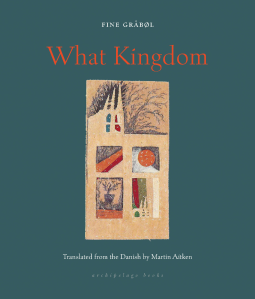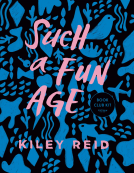
What Kingdom
by Fine Grabol
This title was previously available on NetGalley and is now archived.
Send NetGalley books directly to your Kindle or Kindle app
1
To read on a Kindle or Kindle app, please add kindle@netgalley.com as an approved email address to receive files in your Amazon account. Click here for step-by-step instructions.
2
Also find your Kindle email address within your Amazon account, and enter it here.
Pub Date Apr 16 2024 | Archive Date Mar 13 2024
Talking about this book? Use #WhatKingdom #NetGalley. More hashtag tips!
Description
An incandescent debut about young adults learning how to care for themselves — from within the limits of the psychiatric system
Perfect for fans of Tove Ditlevsen and devotees of Sylvia Plath
In honest, crackling investigations of the psychiatric system and the young people trying to find their way, Gråbøl’s soaring debut offers a critique of institutionalization and an urgent recalibrating of the language and conceptions of care.
“I’m not inarticulate, but I leave language to the room around me,” says Fine Gråbøl’s nameless narrator as she dreams of furniture flickering to life in the room she occupies at a temporary psychiatric care unit for young adults. A chair that greets you, or shiny tiles of floor that follow a peculiar grammar of their own. Our narrator is obsessed with the way items rise up out of their thingness, assuming personalities and private motives. She also cannot sleep, and practices her daily routines with the urgency of survival – peeling a carrot, drinking prune juice – all an acutely calibrated exploration into having a home.
Structured as a series of intimate vignettes like those of Olga Ravn, What Kingdom thrums with the swirling voices of this shared home. Hector blares Michael Jackson from the recreation room and recalls a past in Peru when his psychoses were treated with exorcism. The town would shake the devil out of his small, teenage body before he was relocated to Denmark. Or Marie, who has lived in the temporary unit since she was eighteen, has no idea that her mother lives just four floors below in a permanent care unit.
Echoing the aching writings of Janet Frame on electroconvulsive therapy, or Linda Boström Knausgård’s mythical meditations on silence and mental health, Fine Gråbøl renders a delicate and deep uncoupling from the world.
Advance Praise
"This debut novel centers around the minute day-to-days of a patient in a mental hospital. Gråbøl, a Danish poet beloved by the likes of Olga Ravn and Celia Paul, weaves an intricate picture of a life lived under rules and restraint by creating a text that is simultaneously demure and porous, with an elliptical structure . . . This book is especially exciting because its publisher, Archipelago, rarely puts out debut fiction, and the cover features artwork by Karoline Ebbesen, a Danish painter who was admitted to a mental asylum in 1885 and lived there for the next 50 years." — Dilara O'Neil, Vulture
“It has been a privilege to read this extraordinary work. The unnamed narrator’s absolute vulnerability is transformed into compelling beauty by the authority and precision of her language. I love the pace of the writing. How, after a passage in which the raw pain and hurt break through into anger, a sentence of clear transcendent poetry can follow. The perfect emotional control is astonishing. It is a very exposing, brave book. It lays open the narrator’s frustration at her inability to be heard, to be considered, within the cold strictures of the institution where she passes her days: "the basis of our lives is powerlessness plus capitulation." I was riveted by the attention to detail – it demands our attention, in return; the objective way the narrator perceives the confined world she lives in, without a trace of self-pity, compels us to know she is speaking the truth. There is an urgent need for the system to be changed, for an individual to be listened to, not just dealt with. This book makes us listen.” – Celia Paul, author of Self-Portrait and Letters to Gwen John
Available Editions
| EDITION | Other Format |
| ISBN | 9781953861849 |
| PRICE | $18.00 (USD) |
| PAGES | 152 |
Available on NetGalley
Average rating from 19 members
Featured Reviews
 Eva I, Reviewer
Eva I, Reviewer
I quite liked this book alot honestly. The length of the chapters were a little bit on the shorter side but for this situation that was perfectly alright. The writing style was easy to follow with not many complicated words.
In this case that might also have a tiny small downside as the subject is kinda heavy. It is about a boy that is talking and living his life at a phych ward and his experience with mental illness. When the writing gets to easy the severity of the subjcet tends to often get a little lost along the way. i personally did not feel that it was a huge problem with this book but some people might expereince that the severity is not properly showed.
The book did manged to keep almost some kinda of lught spirit about itself. They talk about how they plan their future, their experince with diffrent medication but tyen afterwards tear them all up as looking at plans stresses the main caracther out. It is serious and we can see and understand that this is problem the mc is struggeling with while it still being kept light enough that we can follow along.
I did overall relly enjoy this book and recemedn it to other people that want an easier read while still being about an heavier subject
Note: *I received a DRC from NetGalley / Archipelago. Thank you to the author, publisher, and NetGalley.*
Translated from Danish by Martin Aitken, What Kindgom is a stream-of-consciousness look into life in a mental institution. Gråbøl offers a searing ritique on the way the government treats the mentally ill, specifically the young.
Our nameless narrator sees life in a unique way. Inanimate objects come to life with phrases such as, “The evening’s bursting, a near-aggressive insistence on light.” This use of personification pulls the reader into the story. Our narrator describes the rain as “applauding, ecstatic,” and such a pathetic fallacy paints a clear picture of how it might feel to be in a psych ward.
Our narrator is pre-occupied with the furniture. She sees them as living lives we can observe, which is something I believe makes sense for someone in that predicament. For her, chairs “address the night,” and this is a vital observation. Our protagonist notices everything. While we never get her name, the reader understands her survival is dependent on discovering herself through these inanimate objects.
Gråbøl creates an atmosphere in a similar vein to Virginia Woolf. While we don’t get to spend much time with the characters, we know just enough about them to form an opinion. Such a cast of characters will naturally blend into each other given the context of setting. A mental institution can be a claustrophobic place.
Additionally, the author uses colour to express the mood of the character. We are shown descriptions such as, “medication-blue” and “egg-yolk yellow”. I felt as though I was spinning on a colour wheel.
Fine Gråbøl takes the senses and brings them the forefront. Just as the characters are suffocated by way of sectioning, the reader is suffocating due to the depth of description the finer details amplify. In Denmark, ONE OF US (an anti-stigma program) has recently emerged, and I believe Fine taking the time to call attention to parts of the text like “to the rest of us” is intentional.
All in all, What Kingdom is a wonderful debut. I understand that Gråbøl is a poet, and I can’t say I am surprised. The beautiful language has not been lost in translation. This book is a modern day classic; one I will return to time and time again.
 Bookseller 1347585
Bookseller 1347585
In "What Kingdom", Grabol's unnamed protagonist recounts and reflects on life in a mental institution in Denmark, the joys, the struggles and the mundanity it entails. Grabol's poetic background is hard to miss in this novel which is adorned with a plethora of metaphors and descriptions written in such careful and captivating ways they never failed to mesmerize the reader. The constant mentions of color, furniture, walls and dimensions, accompanied with the small size of each chapter serve as tools to reflect the protagonist's mental and physical state in a memorable way. Overall, this is a very strong debut and I'm surely keeping my eyes open for other translations of Grabol's work
 Laura G, Educator
Laura G, Educator
What Kingdom is a poet's novel, and feels like one, but it could easily be a painter's novel. It's a breath of fresh air in the violent and suffocating context of the psychiatric ward. The rhythms of everyday life there had a certain zen to it. Nearly every line is stunning, but I am haunted by page 45. "I sometimes wake up and realize that what's going to happen has no name." Unsentimental, striking, and fascinating: I hope that more of Grabol's work is translated into English.
What Kingdom is a really special, introspective read, and I found myself immersed before I was aware of it. As we follow an unnamed narrator through her days in a psychiatric care unit, we feel like we're in a dream, removed from time and space and confined to the world of the clinic. The narrator has no sense of the days and focuses on the events, which makes the entire book, although fragmented, feel like one long continuous experience. We jump (probably linearly?) from period to period, not really knowing where we exist within the timeline, and something about the style made the novel really easy to consume. I felt immersed but removed at the same time, as if viewing the world through a film of cotton in that dreamlike state. The narrator and her ward mates go through the motions of a normal life, and we feel for them as it's clear that they are experiencing anything but. The novel is a lot more abstract than what I've read recently, which is why I think I find myself less enthusiastic with my rating, but it was a welcome change! Overall, a read that I recommend :)
An incredible narration and important view from within the confines of a psychiatric ward. I empathized so much with out narrator, felt so many emotions with them and for them.
One of the most beautiful and personal books I have read in a long time, this book accounts a young woman who is living in a psychiatric unit on a ward with other young people. This short book accounts her days in the unit with the friends she has and her relationships with the therapists, whilst documenting her own internal mental health struggle and impending dissociation from the outside world. It talks in a really direct way about the unglamorous sides of mental health crises but these blunt descriptions of breakdowns are juxtaposed with the narrators deep and pensive reflections on life and what it means to be sick. The scenes of pure joy and friendship are followed by scenes of real darkness. What Kingdom is a book of such emotional affection and one I will be thinking about for a really long time after finishing its final scene.
A moving exploration on mental health, What Kingdom follows an unnamed narrator living in a temporary psychiatric care unit for young people. The prose is beautiful and atmospheric. A short read but very impactful.
Big thanks to NetGalley and Archipelago for an ARC of this.
 Lola J, Reviewer
Lola J, Reviewer
I trust Archipelago to put out interesting books and this one (translated from Danish) was definitely that and more.
Gråbøl lets the reader be in the head of a person that struggles with mental health issues and is living in a psychiatric care unit with other young people. The writing is scattered and it really makes you feel like you are as scattered as the person whose brain you’re in. I think the strength of this novel is that it humanizes mental health issues. Both for ‘normal’ people to understand better and for people that might recognise themselves in the protagonist.
The way the author manages to put quite traumatic events into the narrative that make you go ‘oh, ok’ is quite something. It’s not sentimental, even if my heart hurt for the narrator when I stopped to think what was actually being discussed and what they were going through.
I know I will be recommending this book to people around me. Maybe not everyone, but I have some people in mind that I know will appreciate the writing and the subject.
If the subject appeals to you, I would highly recommend picking this one up. I will be getting myself and a friend a copy.
"Lasse, Waheed, Hector, Marie, Sara and me"
"We’ve been assigned accommodation in accordance with §107, a temporary accommodation offer for young adults between the ages of 18 and 30. The other floors, from first to fourth, come under §108, permanent accommodation. I have no plants, out of principle I own nothing that might die, which is a challenge, because what lives forever, I don’t know."
No plants, but also no name ("I’ve read through my old records, but it's like reading fiction; I recognize the person, only it's not me. It's not me."), no memories, no background, no plans either. She lives only here and now, which is what being in The Youth Unit entails – learning to live, one day at a time.
"The facility [..] is a kind of exploration into having a home."
"A practice home, I suppose you could call it."
Inspired by Gråbøl's own experience, the book offers not only an insight into people’s struggles with mental disorder, but also a critique of the system, from
getting diagnosed: "We know what sort of diagnosis a person’s got even before they’ve mentioned it: boys are schizotypal, girls are borderline or obsessive-compulsive."
to hospitalization: "They call containment of the emotional register treatment."
to the residential facility: "it’s not like they’re interested in a total disintegration of psychiatric power structures; a de-hierarchization of institutional roles and routines, or a new conversation about the dichotomy between ill and well, it’s more that they see part of the distribution of power in terms of a distribution of responsibility."
to the broader societal structures: "The grammar of the ill is gendered, but also a matter of economics; the curable versus the chronic, benefit rates and supplementary payments, diagnoses and deductibles. Cash assistance subsidies, invalidity pensions, disability supplements."
What Kingdom is unusual in its quietness. The tone is consistently flat. Unsentimental even in the depictions of self-harming and suicide attempts. Gråbøl is a poet and it shows.
The art featured on the cover is beautiful and befitting.
 Stephen L, Reviewer
Stephen L, Reviewer
My absolute favorite part of this book was the reference to “Girl, Interrupted”, because that is EXACTLY what I was thinking about when I was reading this book. This book was a little too real at times, as you’re put into the mind of a patient in a psychiatric care unit for adults, but I could not put it down. Beautifully translated and wonderfully written, this is definitely a wonderful add to the Archipelago library.
Thank you to Archipelago and NetGalley for the ARC.
 Mandy J, Reviewer
Mandy J, Reviewer
A powerful and searing account of psychiatric care on Denmark, all the more powerful for not being a condemnation. In fact everyone in the care system is doing their best in very difficult circumstances and with very troubled patients. Based on the author’s own experiences, it all feels very authentic and true-to-life. In a series of vignettes we follow a group of young people in a shared psychiatric ward in their daily life – their fears, their worries, and yes, even their joys. Narrated by an unnamed protagonist, we enter into her thoughts as we see the world and her surroundings from her point of view. I found it a compelling narrative indeed, insightful and empathetic, and felt that I had learned something about mental health by the end.
Readers who liked this book also liked:
We Are Bookish
Literary Fiction, Multicultural Interest, Women's Fiction
Silvia Moreno-Garcia
Historical Fiction, Literary Fiction, Sci Fi & Fantasy
We Are Bookish
Mystery & Thrillers, OwnVoices, Teens & YA
We Are Bookish
Biographies & Memoirs, Nonfiction (Adult), Parenting, Families, Relationships
We Are Bookish
Multicultural Interest, Mystery & Thrillers, Teens & YA
We Are Bookish
Arts & Photography, Health, Mind & Body, OwnVoices
We Are Bookish
General Fiction (Adult), Romance, Women's Fiction
We Are Bookish
Historical Fiction, Mystery & Thrillers, Teens & YA
We Are Bookish
Business, Leadership, Finance, Nonfiction (Adult), Self-Help
We Are Bookish
General Fiction (Adult), Romance, Women's Fiction


















